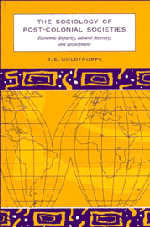Book contents
- Frontmatter
- Contents
- Preface and acknowledgements
- 1 Introduction and argument
- 2 Technology, society, and population
- 3 The colonial episode and the race question
- 4 Economic conditions
- 5 Environmental concerns
- 6 The social sciences and the ‘Third World’
- 7 The rise of towns
- 8 Family life in a changing world: two studies
- 9 Cultural diversity, language, education, and communications
- 10 Religion and development
- 11 Individual modernization: some psychological studies
- 12 Politics in post-colonial states
- 13 Aid and development
- Notes
- Index
10 - Religion and development
Published online by Cambridge University Press: 03 May 2011
- Frontmatter
- Contents
- Preface and acknowledgements
- 1 Introduction and argument
- 2 Technology, society, and population
- 3 The colonial episode and the race question
- 4 Economic conditions
- 5 Environmental concerns
- 6 The social sciences and the ‘Third World’
- 7 The rise of towns
- 8 Family life in a changing world: two studies
- 9 Cultural diversity, language, education, and communications
- 10 Religion and development
- 11 Individual modernization: some psychological studies
- 12 Politics in post-colonial states
- 13 Aid and development
- Notes
- Index
Summary
Some religious movements have been seen as inspiring their followers with qualities, such as honesty, thrift, and hard work, which have enabled them not only to make a better life for themselves and their families, often after surmounting initial adversities, but also to promote general economic development. These movements have been identified accordingly as causal agents in the development process. Some other movements have arisen in reaction to or against social and economic changes, usually for the worse, to which particular groups have been subjected as victims rather than initiators. Reaction against modern developments is a theme these movements have in common with fundamentalism, though the latter has also some unique features, as will appear.
Religion and economic enterprise
Max Weber's monumental study linking the Protestant ethic with the spirit of capitalism, to which I alluded in chapter 1, is so well known as to need no recapitulation here. In support of his thesis, Weber assiduously searched the literature then available in European languages about the religions of ancient Judaism and of the East for parallels with the Protestant ethic, only to conclude that European Puritanism was unique. Thus in China, despite the high state of the arts and crafts and the great urban tradition, the currency was frequently mismanaged, the legal and customary institutions favouring business organization were lacking, and there was no adequate system of book-keeping such as would spur Chinese businessmen to allow adequately for the depreciation and replacement of their physical capital.
- Type
- Chapter
- Information
- The Sociology of Post-Colonial SocietiesEconomic Disparity, Cultural Diversity and Development, pp. 179 - 199Publisher: Cambridge University PressPrint publication year: 1996



